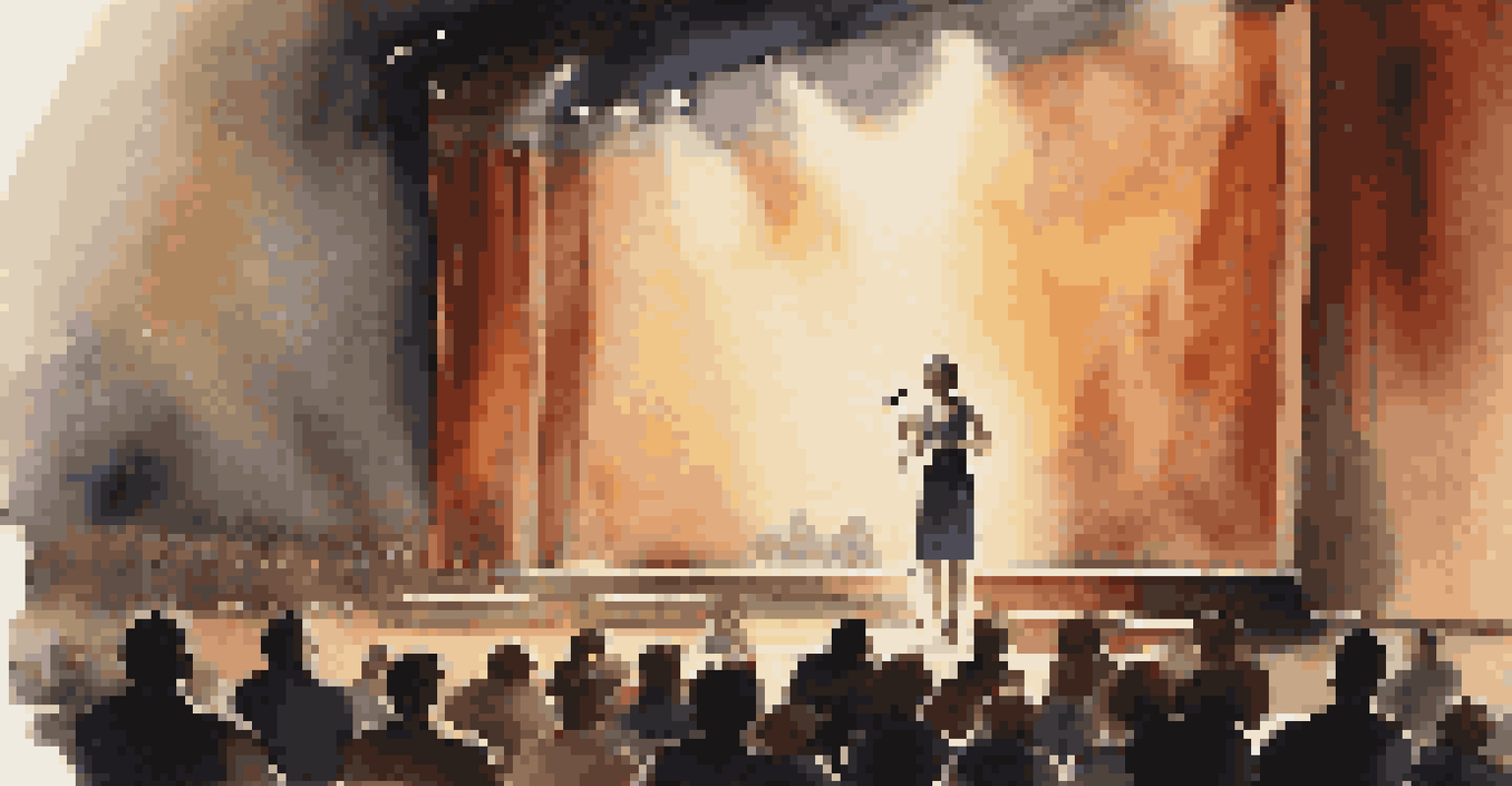Using Relaxation Techniques to Alleviate Performance Anxiety

Understanding Performance Anxiety and Its Impact
Performance anxiety is that nagging feeling of dread before a big event, whether it’s a presentation, a musical performance, or even a job interview. It can lead to physical symptoms like rapid heartbeat, sweating, and mental blocks, making it difficult to perform at your best. This anxiety often stems from the fear of judgment or failure, which can be paralyzing.
Anxiety is like a rocking chair. It gives you something to do, but gets you nowhere.
Many people experience performance anxiety at some point in their lives, and it’s perfectly normal. However, it can become a barrier to success if not addressed. Understanding that you’re not alone in this struggle can be comforting and is the first step toward overcoming it.
Recognizing the signs of performance anxiety allows you to tackle it head-on. The next step is to explore relaxation techniques that can help calm your mind and body, setting the stage for a more confident performance.
The Power of Deep Breathing for Calmness
One of the simplest yet most effective relaxation techniques is deep breathing. This technique involves taking slow, deep breaths to help reduce tension and anxiety. By inhaling deeply through your nose and exhaling slowly through your mouth, you activate your body's relaxation response.

Imagine being on stage, feeling the nerves creep in. Taking a moment to focus on your breath can ground you and shift your focus from anxiety to calmness. This practice not only lowers your heart rate but also helps clear your mind, allowing you to concentrate on the task at hand.
Performance Anxiety is Common
Many people experience performance anxiety at some point, but recognizing it is the first step toward overcoming it.
Incorporating deep breathing exercises into your routine can be a game-changer. Whether it's before a performance or during moments of stress, this technique can help you regain control and boost your confidence.
Visualization Techniques to Boost Confidence
Visualization is a powerful mental exercise that can enhance your performance. This technique involves creating a mental image of yourself succeeding in your performance, which can help reduce anxiety and increase confidence. Picture yourself on stage, executing your tasks flawlessly, and receiving applause.
Mistakes are a fact of life. It is the response to the error that counts.
By imagining positive outcomes, you can rewire your brain to expect success rather than fear failure. This method taps into the mind-body connection, where your brain believes what you visualize, helping you to feel more prepared and less anxious.
Try incorporating visualization into your preparation routine. Spend a few minutes each day picturing yourself performing confidently, and you might just find that your anxiety diminishes as your confidence grows.
Progressive Muscle Relaxation for Physical Tension
Progressive muscle relaxation (PMR) is a technique designed to reduce physical tension and anxiety. It involves systematically tensing and then relaxing different muscle groups in your body. By focusing on the contrast between tension and relaxation, you can cultivate a sense of calm.
Picture this: you’re about to give a speech, and your shoulders feel tight. PMR can help you consciously release that tension, making you feel lighter and more at ease. This technique not only relaxes your muscles but also shifts your focus away from anxious thoughts.
Relaxation Techniques Aid Performance
Techniques like deep breathing and progressive muscle relaxation can help calm your mind and body before a performance.
To practice PMR, find a quiet space, close your eyes, and start from your toes, working your way up to your head. As you relax each muscle group, imagine the anxiety melting away, leaving you feeling rejuvenated and ready to perform.
Mindfulness Meditation for Present Moment Awareness
Mindfulness meditation is about bringing your attention to the present moment, without judgment. This practice helps anchor you during moments of anxiety, allowing you to observe your thoughts and feelings without getting overwhelmed. It’s like hitting the pause button on your racing mind.
When you feel performance anxiety creeping in, taking a few minutes to practice mindfulness can be incredibly beneficial. Sit quietly, focus on your breath, and notice any anxious thoughts as they come and go. Instead of fighting them, acknowledge their presence and let them drift away.
With regular practice, mindfulness can help you develop a greater sense of control over your anxiety. Embracing the present moment before a performance can create a sense of peace that allows your true abilities to shine.
Creating a Pre-Performance Routine for Consistency
Establishing a pre-performance routine can provide you with a sense of control and familiarity. This routine might include deep breathing, visualization, or even a few minutes of stretching to ease physical tension. The key is to find what works for you and make it a habit.
Think of your routine as a warm-up for both your mind and body. Just like athletes prepare for a game, having a consistent routine can signal to your body that it’s time to perform. This can help alleviate nervousness by creating a structured approach to your performance.
Embrace Mistakes for Growth
Accepting that mistakes are a natural part of performing can reduce anxiety and allow for a more authentic experience.
Experiment with different techniques and find a combination that resonates with you. By consistently following your routine, you’ll build confidence and reduce anxiety, making performances feel more manageable.
Seeking Support from Others for Confidence
Don’t underestimate the power of support from friends, family, or coaches when dealing with performance anxiety. Sharing your feelings with someone who understands can provide relief and perspective. They can offer encouragement, share their experiences, or even practice with you.
Imagine having a trusted friend watch you rehearse. Their feedback and support can help you feel more prepared and less alone in your anxiety. This connection can also remind you that everyone struggles with performance at different times.

Engaging with a support system not only alleviates anxiety but can also enhance your performance. Knowing you have people rooting for you can boost your confidence and help you approach your performance with a positive mindset.
Embracing Mistakes as Part of the Journey
Finally, it’s essential to embrace the idea that mistakes are a natural part of any performance. Instead of fearing failure, try to view it as an opportunity for growth. Every performer has stumbled at some point—it’s how you recover that truly matters.
Consider the greats in any field; they often share stories of their own blunders. These experiences not only humanize them but also remind us that perfection is unattainable. Accepting that mistakes happen can significantly ease performance anxiety.
Shift your mindset from striving for perfection to focusing on doing your best. By allowing yourself the grace to err, you’ll find that your anxiety lessens, freeing you to perform authentically and enjoy the experience.